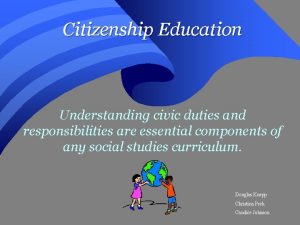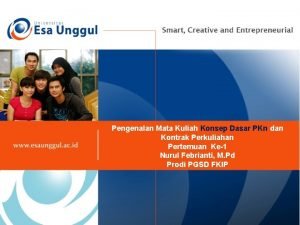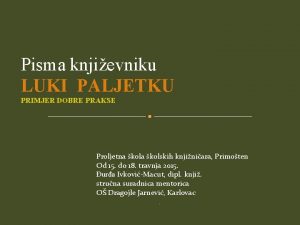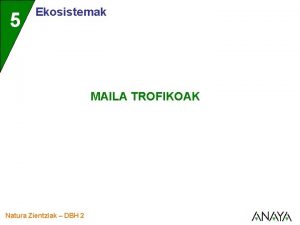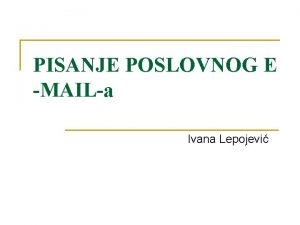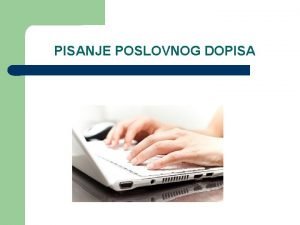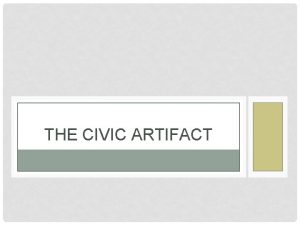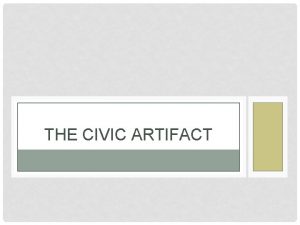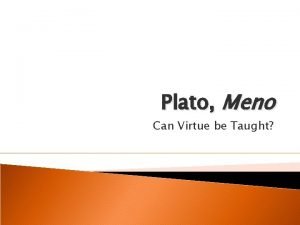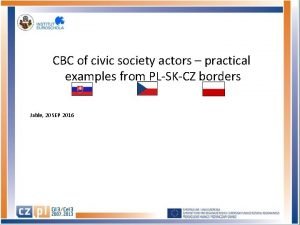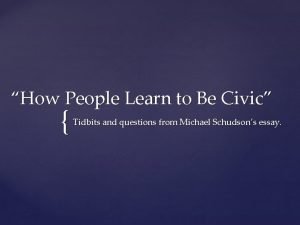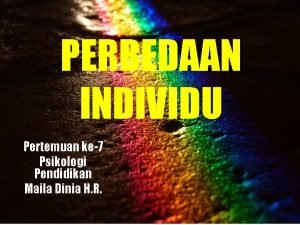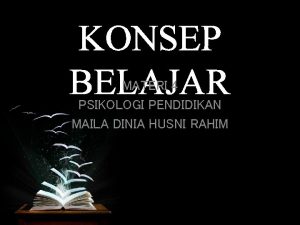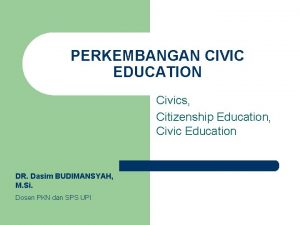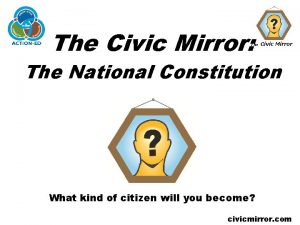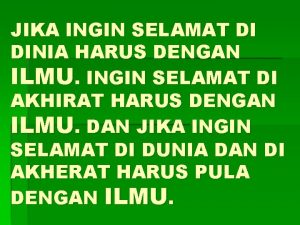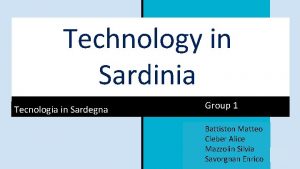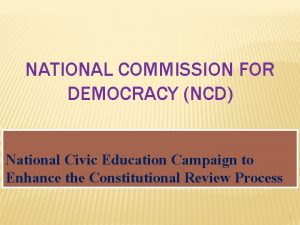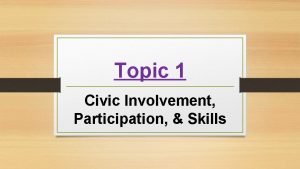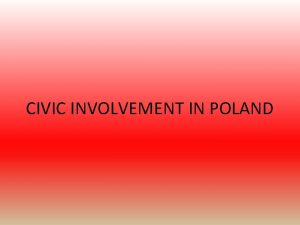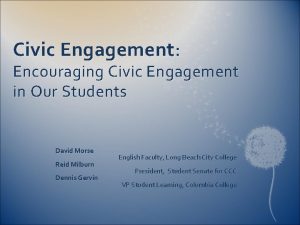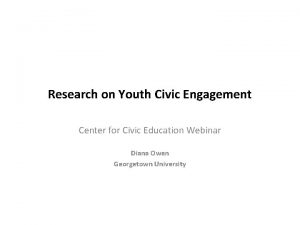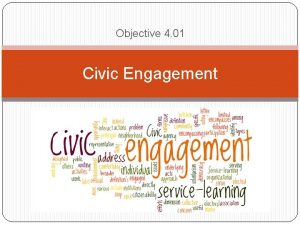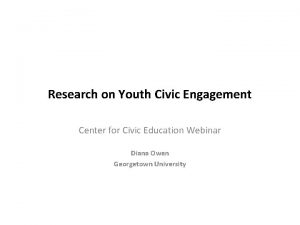NATIONAL IDENTITY CIVIC EDUCATION Maila Dinia HR IDENTITY


























- Slides: 26

NATIONAL IDENTITY CIVIC EDUCATION Maila Dinia HR

IDENTITY Who are you? We all have multiple identities

MEANING OF NATIONAL IDENTITY Who are we?

WHAT MAKES YOU AN INDONESIAN?

WHAT MAKES YOU AN INDONESIAN?

WHAT MAKES YOU AN INDONESIAN? Somebody posted intriguing threads on twitter on the other day. I wasn’t sure what subject that triggered her posting, but she was ranting about Indonesians living overseas who pretend to know more about Indonesia [compares to those who are inside the country], who only like to criticise but do not help. She surprised me when she then said these people should stop being selfrighteous, and should do something real to help Indonesia. If they think that the country is beyond help, these people should just stop being Indonesians. Her threads about being Indonesian – or stop being one, for that matter – got me thinking: what actually does make you an Indonesian?

WHAT MAKES YOU AN INDONESIAN? It is the same question asked to me by a researcher from Glasgow University a couple of weeks a go. The research is looking into the nationality and immigration aspects in Scotland, but half of the questions were about me being an Indonesian. Her questions have opened up my eyes on issues I have never thought about before. So, what does make you an Indonesian? Is it by birth, by ancestry, or by domicile? Do you have to have all three aspects to be a true Indonesian? I was born in Indonesia, my parents are Indonesian, I have spent most of my life in Indonesia, but have been away from the country since a couple of years a go. Does it make me an Indonesian, still?

WHAT MAKES YOU AN INDONESIAN? How about my friend Rose, who was born in Indonesia from Indonesian parents, has spent most of her life in Indonesia but since she is married to a British, she has been living overseas for a couple of years and is holding another country’s passport. Is she not Indonesian anymore? No? Then what is she, British? Do you think British people will call her British? How about my friend Ali, who was born in Indonesia, from Indonesian parents, but has moved to another country since he was 6 years old. Is Ali still Indonesian? If Ali speaks bahasa Indonesia fluently, is he more Indonesian than if he doesn’t? How about if it is the other way around, like my friend Uni, who was born in Austria from Indonesian parents, but they have been living in Indonesia for a very long time. Is she Indonesian? How about my uncle, who was born in German, from German parents, who has been living in Indonesia for over 30 years and is holding Indonesian citizenship. With his blonde hair and blue eyes and fluent bahasa Indonesia, can we call him an Indonesian? Can you erase your original nationality and adopt a new one completely?

WHAT MAKES YOU AN INDONESIAN? To me, birth and ancestry play more important role rather than residence, or a piece of paper or a stamp on my passport. I can be anywhere else and/or hold any other nationality, but I am truly Indonesian. I can’t stop being one, even if I want to! It’s here in my blood, my veins, my skin, eyes, and hair colour, in my custom and culture, in my body language, in… everything! It is like the air we breath and the gravity we take for granted. It’s there, it’s ours. I have not met any single Indonesian who lives abroad, no matter for how long, and denies their home country or their origin. Never. Everybody will immediately call themselves an Indonesian, even if they have spent more than half of their lives outside the country.

WHAT MAKES YOU AN INDONESIAN? I also wonder if those who live outside Indonesia know less about the country compare to those who are living their lives in there, as suggested by the twitter lady. With news spreading faster than the light by the help of internet and social network sites, I guess as long as we have the access, we will get the updates. Maybe we will know later than today, but we would find out quickly enough to keep up with the news and gossips. What separates me from the others, is probably just the degree of interest in different issues. Some will keep up with the celebrity gossips, some will follow politics, some will focus on pop culture, some only will talk about photography, and so on. Even those who do live in Indonesia would not follow all issues – my maid is interested more in celebrity gossips than local elections in her area, for example, so naturally she knows more about local celebrities than politicians. Actually, those who live abroad tend to get news from different sources, which can enrich the perspectives of the news itself. For example, when Indonesian former president Soeharto died, all Indonesian media were being very gentle and only talked about the good stuff, but international media were more blunt, harsh, and quite the opposite, as I wrote it here. But when the bomb blasted in Jakarta last month, UK media reported in similar way as Indonesians, none but all praised the government’s success to crack down the terrorism groups and how the bomb was condemned by the whole nation.

WHAT MAKES YOU AN INDONESIAN? I am not sure either if we need to be physically present to criticise our government. Just like any sport match which everybody thinks they are better than the players or Alex Ferguson plus Jose Mourinho combined, whether they were actually at the match or just watching it on television wouldn’t matter. I guess the only job where you have to be there in order to review it, is food critic. Maybe years from now we could taste food by fax or internet, but not today. I never knew that people who are geographically challenged are not allowed to criticise their government. Everybody has a right to do so, regardless where they sleep tonight, and only our credentials will determine our voice and will make people decide whether we are worthy to listen to. I will definitely listen to Habibie rather than my own siblings about politics, even though Habibie has been spending his days in Germany and they are living and breathing in Indonesia.

WHAT MAKES YOU AN INDONESIAN? I believe nationality is a more complex matter rather than just a geography (ask Barack Obama!). As it is defined in Wikipedia, nationality is about the relationship between a person and their state of origin, it’s about loyalty, it’s about what we feel. It is personal. It is not what the country, nor man, dictates us. It cannot be printed on us and it cannot be taken away from us. It’s who we are.

WHAT MAKES YOU AN INDONESIAN? http: //finally-woken. com/what-makes-you-an-indonesian/ BLOG: FINALLY WOKEN Four seasons in one day, two countries in one heart Anita, an Indonesian trailing spouse, currently living in Perth, Australia, a travel junkie, a cat lover, and a food enthusiast. The term trailing spouse is used to describe a person who follows his or her life partner to another city because of a work assignment. The term is often associated with people involved in an expatriate assignment but is also used by academia on domestic assignments.

NATIONAL IDENTITY • I am Indonesian • You are less Indonesian • You are not Indonesian • How can the concept of a national identity both unite and divide people?

WHAT IS NATIONAL IDENTITY? • • • A card? A language? An origin? A culture? A Religion? An ethnic group?

WHAT IS NATIONAL IDENTITY? Definition of national identity in English: noun A sense of a nation as a cohesive whole, as represented by distinctive traditions, culture, and language: his country’s lack of an explicit national identity [mass noun]: the image represents the Queen as an emblem of national identity http: //www. oxforddictionaries. com/definition/english/national-identity

WHAT IS NATIONAL IDENTITY national identity (noun ) the depiction of a country as a whole, encompassing its culture, traditions, language, and politics

WHAT IS NATIONAL IDENTITY? “identity” is an important but elusive quality, and “national identity” even more so. What goes on in people’s heads is very complicated and difficult for historians to pin down. We do have evidence at least about the “public faces” of people’s identities. The processes by which those identities are constructed are themselves very complex, involving a number of psychological and sociological mechanisms, and varying according to context and situation. Peter Mandler, Modern Intellectual History / Volume 3 / Issue 02 / August 2006, pp 271 -297 2006 Cambridge University Press

CIVIC & ETHNIC CONCEPTIONS OF NATIONAL IDENTITY There are two widely accepted conceptions of nationality: ‘ethnic’ and ‘civic’, both of which are linked to the development of nations and states in Europe. The civic conception of nationalism helps explain the development of nations in states that had already emerged as political and geographical units (for example, France). As such, the nation was defined as the totality of people living within the boundaries of that state and abiding by its laws. Ethnic national identity is characterized by an attachment to one’s ancestry, tradition, culture and language – and not necessarily to the state a person was born and lives in. This is why an ethnic national identity is exclusive: if you are not born into it, you cannot acquire it (Ignatieff, 1995)

“Pancasila” – The Key to the National Consensus in Indonesia Ahmed Mahmoud Journalist Al-Ahram Press Foundation Participant in the Egypt – Indonesia Dialogue on Democratic Transition

“Pancasila” – The Key to the National Consensus in Indonesia When you look at the smiling Indonesian citizens to you and notice that there are veiled women and others who wear cloths on modern European style you would definitely ask yourself how are they that harmonious? . And when you meet someone in Jakarta for sure he or she will ask you where did you come from? However I bet you that they will ask you what your religion is. The Indonesian citizen makes you always feel that there is no difference among any religion in a country that includes nearly 300 religion and ethnic groups with no extremism. This question about harmony among Indonesian citizens, which took place in the minds of the Egyptian delegation members during a visit to Jakarta last week to participate in a workshop organized by the “Institute of Peace and Democracy Bali” on the elections management bodies, after the workshop we visited two polling stations during voting and a third during the counting of votes in a local elections event which took place in the suburbs the capital Jakarta, the Egyptian delegation noticed the friendly atmosphere based on respect among participants and the Organizing Committee of the elections, we discovered that this was normal due to the fact that all the members of the Organizing Committee are from the same area and they are volunteers and that the voters know them and that caused a great confidence in the election process because everyone has interest of the development of their small community.

“Pancasila” – The Key to the National Consensus in Indonesia That was a great concern of the Egyptians, as Egypt is going to start a democratic elections process soon and questions are raised about will elections go without violence or fraud? And if so, how to avoid the risk of sectarian tension? We’ve got to answer in one word; it is “The Pancasila”. That word helped Indonesia to survive threat of sectarian tension in the light of this great diversity of beliefs among the population of the State’s nearly 238 million people. The Pancasila are five principles formulated in the Constitution of Sukarno in 1945 which was taken back to Indonesia after the fall of Suharto and its constitution to become the basis of the doctrine of the emerging country and to ensure Indonesian to be gathered although the different religions and beliefs on one goal which is the democratic state as long as the whole population believes in one eternal god for all the humanity. . The history of The Pancasila goes back to the year 1945, when a committee was preparing for independence of Indonesia to lay the foundations of the emerging State, and when the dispute heated between the Islamic groups and the other national groups on the basis of the state whether it should adopt the reference of Islam and becoming an Islamic state or the state should be a civilian one.

“Pancasila” – The Key to the National Consensus in Indonesia Sukarno, the first president of Indonesia after independence, took “The Pancasila” to be the basis of the philosophy of the state, the Commission, which was formed of nine Islamic and national leaders finalized the Indonesian mission by forming the Charter of Jakarta, which was signed on June 22 of the year 1945, this Charter became the Introduction to the Constitution of independence, which set The Pancasila as the embodiment of the fundamental principles of the Indonesia’s independent State which was announced by Sukarno in a speech known as “the birth of The Pancasila. ” Although the Islamists in Indonesia at that time insisted on the Islamic identity of the new state, the authors of the constitution insisted on The Pancasila culturally neutral identity, compatible with the democracies and Marxist ideologies, to be the principle of combined heterogeneous cultural differences of the population.

“Pancasila” – The Key to the National Consensus in Indonesia And so the Indonesian state survived of the rip after the fall of Suharto in 1989 when the country passed an unstable state of chaos and civil war almost braked the model of one the most successful democracies in the world, and so also survived the Indonesian state, with a population of 238 million people spread over 300 ethnic groups and doctrine governed by a Muslim-majority up to 60% of the population, where the wisdom and the desire to a safe state accompanied by a personal interest of the Indonesian politicians to become the way to proceed in the path of progress away from all those constraints. There is no doubt that the great similarity between the events experienced by Egypt now and those that occurred in our sister country Indonesia before 13 years gives us the hope to survive Egypt from the dangers which threaten the country if prolonged, taking in consideration those democracies that were able to be saved thanks to the tolerance and keeping away from extremism and having in the same time genuine desire to achieve progress, growth and social justice for all people by following as an example those experiences during hard moments of the similar country’s history.

PANCASILA IS THE BLUEPRINT OF INDONESIAN NATION Pancasila is the philosophical basis of Indonesia, Pancasila, which are the "Five Moral Principles" of Indonesian life and society, embrace humanitarian ideals that are mutually interlinked and inseparable. .

PANCASILA AS NATIONAL IDENTITY • • • "Belief in the one and only God, " which means every Indonesian citizen, no matter which religious denomination or faith they follow, should respect each other’s belief for the sake of the harmony and peace of mankind. This Principle contains the precept of religious tolerance and freedom of all to adhere to the religion or faith of his or her choice. "Just and civilized humanity, " which is closely identified with balancing fundamental individual human rights and freedoms with the individual’s obligation toward society and state. This Principle highlights the idea that relationships within society and state be based on a just and civilized morality. “The Unity of Indonesia, ” which means one country, one nation, one language, binding together the diverse people in the archipelago "Democracy, " which within Pancasila connotes democracy in the formal sense and in the material sense as well. It is a democracy imbued with belief in the One, Supreme God, with the morality of a just and civilized humanity and directed toward the goal of social justice for the entire people. It is a democracy conceived in consonance with Indonesia’s own traditional and social values, which emphasize consensus and imply not only political equality, but economic, social and cultural equality. "Social justice, " which contains the basic principle that in the common endeavor to attain a just and prosperous society, materially as well as spiritually, any form of exploitation of human beings is prohibited. This Principle points to the necessity to create conditions whereby all groups of Indonesians have an equal and just opportunity to earn their livelihood and secure a life with human dignity.
 Civic duties vs civic responsibilities
Civic duties vs civic responsibilities Differences between duties and responsibilities
Differences between duties and responsibilities Apa itu civic education
Apa itu civic education Prvo ljubavno pismo luko paljetak
Prvo ljubavno pismo luko paljetak Maila kuusik
Maila kuusik Diren
Diren Pisanje poslovnog maila
Pisanje poslovnog maila Primjerak dopisa
Primjerak dopisa Civic mirror
Civic mirror California seal of civic engagement
California seal of civic engagement Civic space collaborative
Civic space collaborative Civic engagement meaning
Civic engagement meaning Civic mirror hidden agenda
Civic mirror hidden agenda How were washington’s actions examples of civic virtue?
How were washington’s actions examples of civic virtue? Brampton civic hospital pharmacy
Brampton civic hospital pharmacy Civic artifacts
Civic artifacts Civic artifact
Civic artifact Whats a meno
Whats a meno Web design civic
Web design civic Gas leak
Gas leak Tumbler
Tumbler Civic actors examples
Civic actors examples Audrey howatt
Audrey howatt Civic event definition
Civic event definition Be civic
Be civic Civic online reasoning poster
Civic online reasoning poster Center for civic design
Center for civic design
